
This is the sixth and final instalment in a series of critical ponderings on Metamodernism. Previous instalments: Intro, Part 1, Part 2, Part 3, Part 4, Part 5, Part 6, Metamodern Meaning Podcast.
It’s about time we bring this critique home and true to my nature I’d like to end it on an optimistic note. This critique was never meant as a death blow to Metamodernism but as a distillation. I see this critique the same way as I see (in my optimistic moments) this year in my life: as burning away of that which doesn’t serve. The old alchemical version of the INRI above Christ’s cross comes to mind: Igne Natura Renovatur Integra — through fire nature is reborn whole.
The primary bone I’ve picked in this series in the self-serving and reductive nature of stagial models in Metamodernism, which oversimplify cultural complexity and impose linear complexity hierarchy that Metamodernists (conveniently) sit atop.
But as I alluded to earlier in the series, there is a more modest conception of Metamodernism which is not just more accurate but strategically superior. This more modest Metamodernism has more pragmatic value for a Metamodern community seeking to make an impact in the world (or simply seeking to endure).
As we looked at in Part 4, Jamie Wheal (Stealing Fire, Recapture the Rapture) did a great post-mortem of Integral theory with Rebel Wisdom back in 2020. The Integral movement as we have seen based itself around this idea of cultural hierarchy (with the Integrals naturally sitting atop said hierarchy). In that post-mortem Wheal gives a great account of what went wrong: hierarchy. As I put it in Part 4:
“Surprise surprise when you create a linear hierarchy of worldviews in which each stage is more awakened and complex than the previous, people want to be on top. Wheal attributes the unravelling of the Integral movement to this hierarchisation. Instead of going out there and doing something (anything) the Integral movement became a dick-measuring competition for who was the most advanced.”
I can’t help but feel that Metamodernism with its “decentration”1 hierarchy is falling into the same trap. Instead of being a subculture or worldview that is oriented towards bridging between worldviews it is setting itself up as a king of the hill.
I believe that Metamodernism can be a cultural logic of cultural logics without the self-reflection becoming the gaze of Narcissus. We already have two signposts in this direction: Dumitrescu’s “tendency towards integration” and Peterson’s peacemaker are moves in that direction. These are earlier Metamodern (explicitly in the form case) attitudes that lack the stage model hierarchy element.
Perhaps Hanzi Freinacht is right and Metamodernism requires a certain level of mental complexity to appreciate. But I don’t believe that Metamodernism is the only one that requires such a complexity. I do not believe Metamodernism is necessary but contingent — one paradigm/episteme/worldview/subculture among many. Despite its contingency, I believe it is a paradigm that can do a lot of good in the world. But I believe this hegemonic hierarchising endangers that and risks (as with Integral) collapsing into a dick-measuring, back-patting exercise in which an ingroup takes for granted its superiority and proceeds to infight over its chosen metric: who is the most complex? who is the most self-reflective? And I fear “with this regard their currents turn awry, And lose the name of action”.
With this decentration/stagial model hierarchy, I believe that Metamodernism is doomed to the same fate as Integral (assuming it ever achieved the same memetic power). But I don’t believe that this decentration hierarchy is central to the Metamodern subculture (nor for that matter, ironically, is ironic sincerity). I believe that Dumitrescu’s “tendency towards integration” speaks more to the heart and soul of the movement and it is this tendency that should be foregrounded.
In contrast to the Integral hierarchising meltdown future for Metamodernism, consider a Metamodernist community that conceives of itself merely as one worldview among many. Such a naked contingency removes the specialness of such a community. It can no longer be taken for granted that it is the next stage and that those in this community are way ahead of the mass populace. Metamodernism is a meme-complex in a world with thousands of meme-complexes. It has certain advantages it is true. But it is not guaranteed to eat the world like the philosophy of the French Postmodernists did. It is not guaranteed to be anything more than a footnote in history. It may remain a drop in the collective ocean — a subculture that never penetrated more than 0.01% of the culture.
This kind of Metamodernist community has to fight for relevance. Without theoretical assurances of its exceptionalism, it is oriented outwards rather than inwards. Instead of disintegrating as the Integral movement did over an ingroup version of King of the Hill, such a fragile, contingent worldview encourages co-ordination. Co-ordination because an insubstantial movement requires actions to gain esteem. It cannot rest on a theoretical throne it has built for itself but must go out and prove its value. This I see Jason Storm’s work to create a Metamodern research paradigm as attempting. I can see it in McGilchrist’s work (which I consider at the very least Metamodern adjacent). A Metamodernism which isn’t destined for mass-adoption in a couple of decades must go forth and braid, oscillate, peacemake and show that it can integrate worldviews together and show that it can depolarise our culture and our discourse and bring its adherents to a greater quality of life. This is a Metamodernism that is worth investing in but it is not a Metamodernism that will come to fruition with hubris.
The work of peacemaking is hard work that cannot be taken for granted and is perhaps likely to fail (one need only contemplate this story of a piano tuner to evoke the right humility regarding expertise in different worldivews). Appreciating the difficulty of the challenge and its contingency has the chance to orient the Metamodern community outwardly and towards action rather than inwardly towards competition and echo chambering. It is not easy to take other’s perspectives. It is not easy to see their axioms. It is not something we get by virtue of our developmental stage. It is hard. Very hard. But it is good, honest work that has the power to nudge the world in a more loving, tolerant direction.
That concludes the series. I will be chatting to Brendan in the next couple of weeks and will post the interview on here as well as the link to it on his YouTube channel Metamodern Spirituality. Thank you for going on this journey with me. I hope it has brought some fraction of the value to you that it has to me.
Previous:
Next:
Decentration being Dempsey’s formulation. In Freinacht we have it in a more nakedly Wilberian form as a developmental psychological hierarchy.

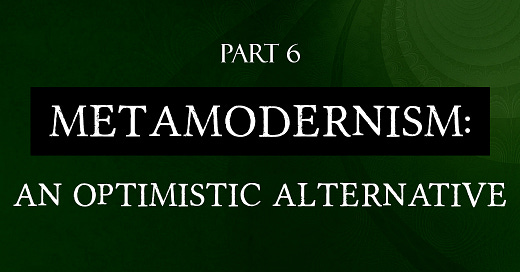



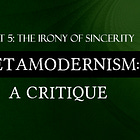
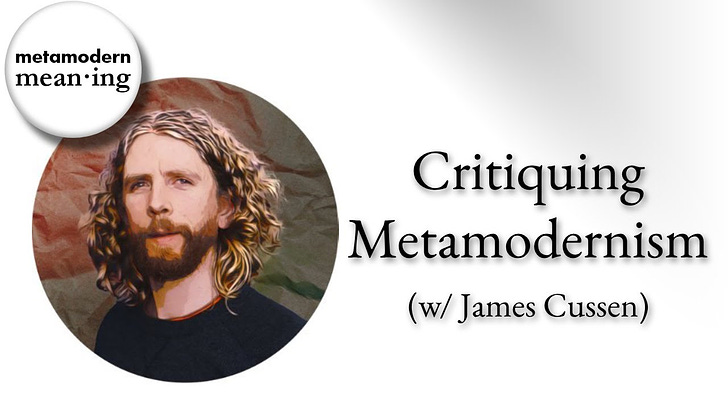





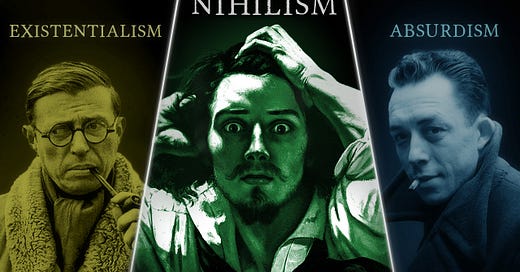



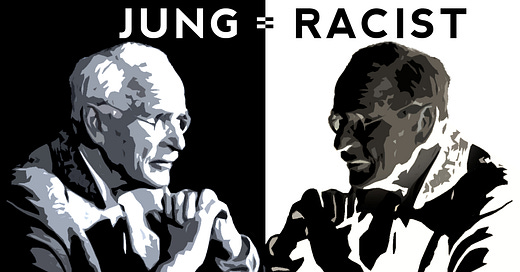

Loved this series! Particularly agree with your critique regarding linearity/hierarchal thinking, I feel like there is definitely something sinister about how metamodernism represents itself as the “most advanced” way of thinking, when it seems like it is only relevant in a western intellectual context. I feel like there is a level of condescension that mirrors something relating to ideas in effective altruism, like assuming you know what is best for everyone but your own pov is the unexamined starting off point (eurocentrism in this case)?. Im not super well versed in this topic so maybe it is standard to assume that any discussion of metamodernism is by default only in the context of western intellectual history (but even this assumptions itself feels condescending, as if other intellectual histories are not worth acknowledging ) but i feel like i rarely come across any metamodernist thinkers who truly discuss or acknowledge the cultural limitations/origins of their beliefs, esp since metamodern ideas draw heavily from eastern philosophies and metamodernism itself is mainly discussed in left leaning circles where “wokeness” is an important quality . Sorry for the messiness, these are some very early and elusive intuitions from someone who was raised biculturally, but in the off chance that you can make sense of what im getting at i would love to hear your thoughts on this!